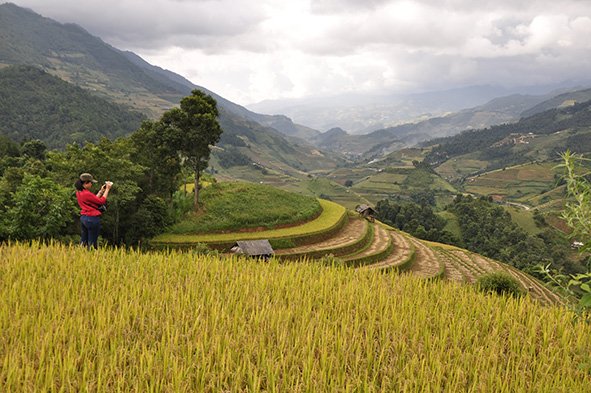
Mu Cang Chai, a district of Yen Bai Province in the nation's northern upland, has become one of the most popular destinations for travelers and photographers to capture beautiful images of terrace rice fields and daily activities of ethnic minority peoples.
Mu Cang Chai, a district of Yen Bai Province in the nation’s northern upland, has become one of the most popular destinations for travelers and photographers to capture beautiful images of terrace rice fields and daily activities of ethnic minority peoples.
Tourists from HCMC can fly to Hanoi and then rent a car or take a bus to get to Mu Cang Chai, about 280km from downtown Hanoi. Some local youth opt for conquering Mu Cang Chai by motorbike with the starting point in Hanoi.
 |
| A panoramic view of the terrace rice fi elds in Cau Ba Nha Commune in Mu Cang Chai District of Yen Bai Province |
The best time to visit Mu Cang Chai is from mid-September to late October when weather is the best of year and when the immense terrace rice fields there all turn yellow, creating the best image of year.
One month prior to the Mu Cang Chai trip, travelers should make hotel room bookings as thousands of people often rush to the area to view the terrace rice fields in full bloom.
There are some hotels and hostels near Mu Cang Chai area, including Tu Le Commune, Khau Pha Pass and Nghia Lo Town in Yen Bai Province. The three-star Suoi Mo Hotel on Dien Bien Street is highly recommended as this is a convenient hotel in Yen Bai.
It normally takes about three days and two nights to visit all the best terrace rice fields in Tu Le valley, Khau Pha Pass, La Pan Tan, Cau Ba Nha and Che Cu Nha communes. The best time to photograph the terrace rice fields is from 7 a.m. to 9 a.m. when the landscape looks gorgeous in mist and sunlight beams. Rising smoke from the kitchen of a house on stilts may make the scene more beautiful and romantic.
Khau Pha, one of the most magnificent passes of Vietnam, provides a real breathtaking view. From there travelers can almost touch the clouds hanging over the terrace rice fields in the valleys of H’mong and Thai ethnic minority groups.
Those wishing to explore daily activities of H’mong people should head for La Pan Tan that was recognized as a national tourist attraction in 2007. Some roads in La Pan Tan are under construction so tourists have to walk about 20 minutes. Along the way, tourists can pass by a local resident’s house to see how they live. A typical home in La Pan Tan is covered with ripen corns on the terrace and surrounded by wooden cages for pigs and cows. Women take care of their children or come to the fields with their husbands. During an afternoon break they gather at a small burning stove inside the house to cook and eat. Tourists can also ask locals to perform khen, a traditional pan-pipe played by men in the northern upland to attract women.
A must-see destination is Cau Ba Nha, about 10km from Mu Cang Chai’s center, as it has mam xoi, a giant round shape terrace rice field on the top of a mountain. It is difficult for tourists to get to mam xoi due to a muddy and rough road. They can take a xe om (motorbike taxi) or walk about 30 minutes to reach the top.
Some popular specialties of Yen Bai that tourists should taste and buy for souvenirs are Tu Le sticky rice from Muong Lo field in Yen Bai and green rice flakes originated from Tu Le Commune in Van Chan District. These two products have light sweet and sticky tastes with special aromas. Yen Bai is also known for some dishes such as salmon and sturgeon hotpots, fried bumble bees and steamed chicken, among others.
Tao meo, a species of small apple in mountainous regions, is a special fruit of Yen Bai as it is good for those having stomach and heart-related diseases and high-blood pressure, and going on a diet. The best tao meo can only be found from September to October.
(Source:SGT)




